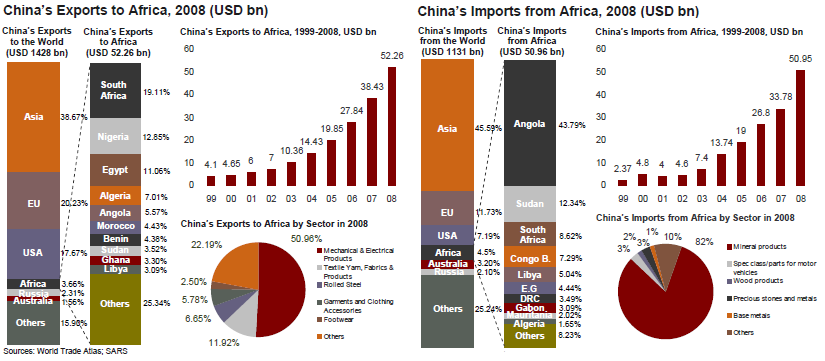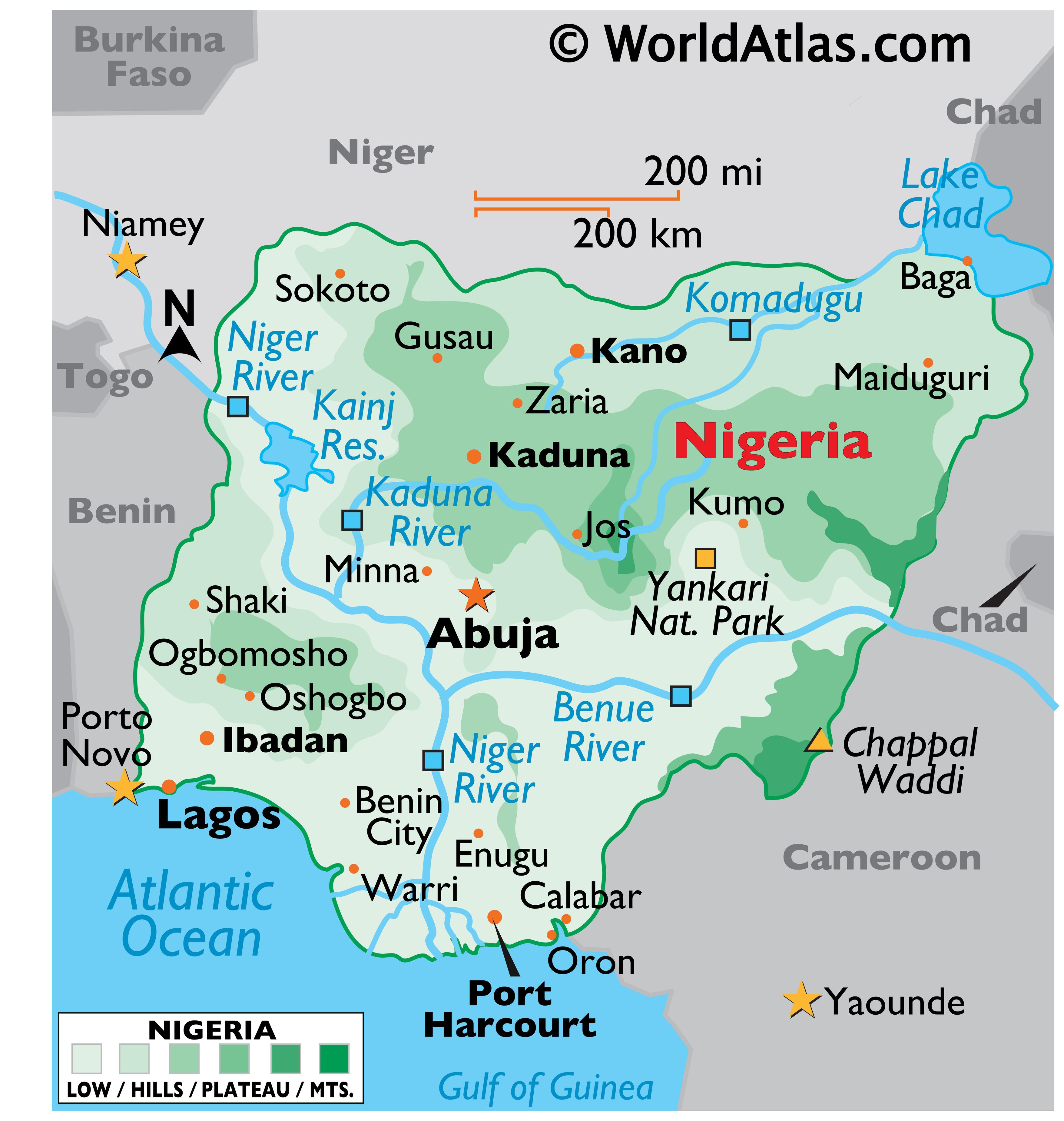
There has been a change in ideological sentiment on China’s involvement in Africa. The paradigm shift has been led by Zambian economist Dambisa Moyo’s bestseller, Dead Aid, which gave voice to the possibility of a development model defined by diligent business practices as opposed to the traditional Western model which is driven by foreign aid. If managed prudently the Sino- African relationship could prove to be an empowering change for several African governments and provide the foundation for the continent to take its place as a partner in the global economy. For China, Africa is an excellent complement to its resource and market-seeking global agenda. Since 2000 China-Africa trade has grown at an average annual rate of 33.5 per cent. Although still second to the United States (whose trade with Africa amounted to US$140 billion in 2008), trade rose from US$55 billion in 2006 to around US$107 billion in 2008, accounting for 4.5 per cent of China’s total trade and surpassing the US$100 billion trade target set for 2010 at the 2006 Forum on China- Africa Cooperation (FOCAC).

China has also identified the value of Africa as a political ally in its quest for a greater role in international affairs. The benefits of China’s African diplomacy became clear in 1971 when China’s accession to the UN General Assembly and Security Council was assisted by 26 affirmative votes cast by African countries. Today China has diplomatic relations with 49 of 53 African nations and China’s deepening engagement means that the US, Europe and other emerging partners have little choice but to compete for access to the continent’s emerging markets and resources. In November 2009, Chinese Premier Wen Jiabao took the opportunity to declare China’s commitment to African development while challenging the established industrial powers to do the same:
In the global financial crisis, what people tend to easily ignore is the implementation of the Millennium Development Goals … Here I would like to once again appeal to the international community to work hard with firm determination and effective measures to reach the MDGs while tackling the global financial crisis.
This declaration was accompanied by the announcement of US$10 billion in preferential loans to support African countries over the next three years. In light of the OECD’s prediction that the G8 will fall US$23 billion short of its 2005 promise of US$50 billion in foreign aid to the poorest and most vulnerable by 2010 (Africa contains 33 of the 49 Least Developed Countries, as classified by the UN ), it is little wonder China’s diplomacy is gaining traction among African governments.
Although the China-induced resource boom is providing a shortterm fillip to African growth and Moyo’s ambitions for a business-driven model of growth, China alone will not be the continent’s saviour. To avoid destructive competition in the region, a cooperative framework on African issues is required between China, the US and Europe and emerging partners to the continent such as Brazil, India and Russia. This is increasingly important in the context of trade frictions that are present in the current global economic environment.
Legitimate concerns about human rights and exploitative practices surround China’s non-interference based involvement in African nations. The list includes arms dealing with repressive regimes, support for autocratic governments isolated by the West, plundering resources with little concern for environmental issues and importing unskilled Chinese labour who are culturally ignorant and unwilling to integrate.
Many of these issues highlight what seem to be self-serving political and strategic motives behind China’s activity in Africa. Many are fuelled by Western hypocrisy. The West’s involvement on the continent has been, and continues to be, littered with tales of mismanagement, exploitation and funding despots. Furthermore, China is hardly alone in marrying political and strategic considerations to its aid agenda. In December last year the US President, Barack Obama, signed off on a deal with Israel worth US$2.77 billion in 2010 (worth a total of US$30 billion over the next decade) with 75 per cent tied to the purchase of US-made military hardware.
Defending exploitative behaviour is not the issue. The business-driven model of development provides new opportunities to several African nations long overlooked as legitimate trading and investment partners. African countries and the African Union need coherent, longterm strategies to apply leverage to international commercial interests and to create opportunities for enduring economic competitiveness and growth. With the prediction by the International Energy Agency that China’s oil imports will increase four-fold by 2030, it is vital for Africa itself to respond strategically to the opportunity that China offers the continent. Although the FOCAC provides an effective forum to develop diplomatic and commercial relations, the issues cited above will continue to bedevil China’s involvement with the continent if strong institutional frameworks of governance and dispute resolution mechanisms are not properly implemented.
In the latest issue of The Atlantic magazine, China's resource play in Africa and development pledges are discussed in vivid detail and questions are asked.
All across Africa, new tracks are being laid, highways built,ports deepened, commercial contracts signed—all on an unprecedented scale, and led by China, whose appetite for commodities seems insatiable. Do China’s grand designs promise the transformation,at last, of a star-crossed continent? Or merely its exploitation?
At some point, at sometime, Africans are going to have to take control of their own destinies. Howard is very descriptive in regards to what Chinese laborers and business men are doing in Africa. However, one ends up asking: "What are Africans doing to advance their own needs?"
Surely they can't all be reading the paper and taking a nap?
All joking aside, the cold reality is that foreign attempts to develop Africa have spectacularly failed. No one disputes that developmental polices have traditionally been short sighted. Nevertheless, development projects are only as good as the repairman has money, skills, ambition, a society that encourages entrepreneurship, and the will to see the service they manage succeed.
The only people that can - and should - save Africa at the end of the day, are Africans.

 [/caption]
[/caption]


![[BHARTI gfx]](http://sg.wsj.net/public/resources/images/MK-BB190A_BHART_NS_20100216180418.gif)
 The Tata booth, like its automotive products, is scaled down. No glitz and no girls. Instead, India's top vehicle maker by revenue has two cars of note on display: a concept electric Nano and the Aria, a crossover with the frame of a small SUV and the curvature of a Minivan. Neither are necessarily sexy or powerful -- or any of the other Geneva Motor Show buzzwords....
The Tata booth, like its automotive products, is scaled down. No glitz and no girls. Instead, India's top vehicle maker by revenue has two cars of note on display: a concept electric Nano and the Aria, a crossover with the frame of a small SUV and the curvature of a Minivan. Neither are necessarily sexy or powerful -- or any of the other Geneva Motor Show buzzwords....

 [/caption]
[/caption]
 [/caption]
[/caption]

